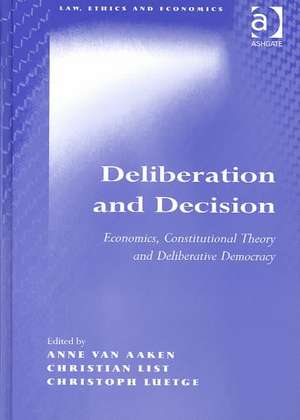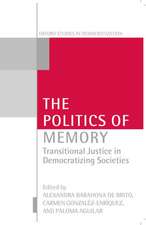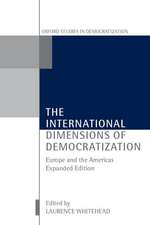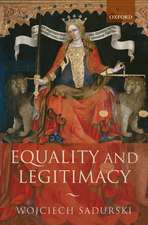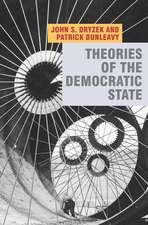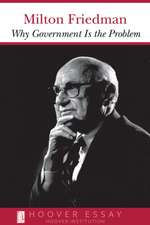Deliberation and Decision: Economics, Constitutional Theory and Deliberative Democracy: Law, Ethics and Economics
Autor Anne van Aaken, Christian Listen Limba Engleză Hardback – 28 feb 2004
Preț: 765.52 lei
Preț vechi: 1103.57 lei
-31% Nou
Puncte Express: 1148
Preț estimativ în valută:
146.50€ • 159.08$ • 123.06£
146.50€ • 159.08$ • 123.06£
Carte tipărită la comandă
Livrare economică 22 aprilie-06 mai
Preluare comenzi: 021 569.72.76
Specificații
ISBN-13: 9780754623588
ISBN-10: 0754623580
Pagini: 296
Dimensiuni: 153 x 219 x 19 mm
Greutate: 0.53 kg
Ediția:1
Editura: Taylor & Francis
Colecția Routledge
Seria Law, Ethics and Economics
Locul publicării:Oxford, United Kingdom
ISBN-10: 0754623580
Pagini: 296
Dimensiuni: 153 x 219 x 19 mm
Greutate: 0.53 kg
Ediția:1
Editura: Taylor & Francis
Colecția Routledge
Seria Law, Ethics and Economics
Locul publicării:Oxford, United Kingdom
Cuprins
Contents: Part I: Deliberation and Constitutional Theory: Deliberative institutional economics, or does Homo Oeconomicus argue? A proposal for combining new institutional economics with discourse theory, Anne van Aaken; Deliberative institutional economics: mind the gap! Comment on Anne van Aaken, Michael Wohlgemuth; What do we learn by asking whether Homo Oeconomicus argues? Comment on Anne van Aaken, Matthias Meyer; Constitutionalism and its alternatives, John S. Dryzek; Democracy, discourse and constitutional economics: comment on John S. Dryzek, Viktor J. Vanberg; Deliberation as a discursive feature of contemporary theories of democracy: comment on John S. Dryzek, Axel Tschentscher; Constitutional economics in constitutional jurisprudence, Axel Tschentscher. Part II: Deliberation and Social Choice: A dilemma for deliberative democrats, Philip Pettit; Collective rationality: a dilemma for democrats with a solution through deliberation? Comment on Philip Pettit, Natalie Gold; Deliberative constitutional economics? Comment on Philip Pettit, Christoph Luetge; Substantive and meta-agreement, Christian List; Economics and the political discourse: comment on Christian List, Rüdiger Waldkirch; The importance of information - remarks on the constitutional economics of deliberative theory: comment on Christian List, Detlef Aufderheide; Democracy and argument: tracking truth in complex social decisions, Luc Bovens and Wlodek Rabinowicz; Deliberative democracy and collective truth-tracking: comment on Luc Bovens and Wlodek Rabinowicz, Thomas Schmidt; Where can the insights from the Condorcet jury theorem be applied? Comment on Luc Bovens and Wlodek Rabinowicz, Alois Stutzer. Part III: Deliberation and Social Order: What is meant by consent?, Andreas Suchanek; On the normative notion of consent: comment on Andreas Suchanek, Martin Rechenauer; The morality and heuristics of consent: comment on Andreas Suchanek, Jurgen De Wispelaere; The consequences of popular participation in constitutional choice - towards a comparative analysis, Stefan Voigt; Is there a need for a positive constitutional economics? Comment on Stefan Voigt, Michaela Haase; Constitutional culture and comparative analysis: comment on Stefan Voigt, Horst Hegmann; Bargaining over beliefs, Robert E. Goodin and Geoffrey Brennan; Final remarks: deliberation and decision - perspectives and limitations, Christian Kirchner.
Notă biografică
Dr Anne van Aaken is a Research Fellow at the Max Planck Institute for Comparative Public Law and International Law in Heidelberg, Germany, Dr Christian List is a Lecturer for the Department of Government at LSE, London, UK and Dr Christoph Luetge is Assistant Professor at the Chair for Philosophy and Economics
Recenzii
'...offers a sound overview of the issues...and sets the interested researchers, political scientists as well as economists and philosophers, thinking.' Public Choice
Descriere
Deliberation and Decision explores ways of bridging the gap between two rival approaches to theorizing about democratic institutions: constitutional economics and deliberative democracy. The two approaches offer very different accounts of the functioning and legitimacy of democratic institutions. The book provides a comprehensive overview of the recent debate between the two approaches and makes new and original contributions to that debate.
